Ring the changes
Updated: 2012-01-08 15:15
By Chen Nan (China Daily)
|
|||||||||||
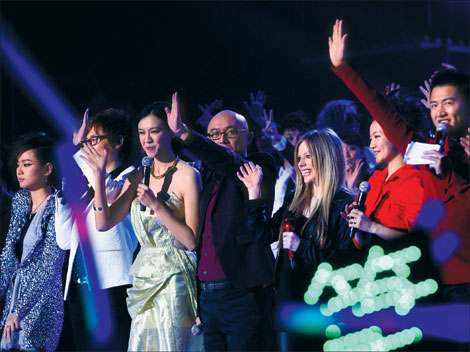 |
|
Stars from home and abroad gather for the New Year's countdown at Jiangsu Satellite TV's New Year's Eve gala. Provided to China Daily |
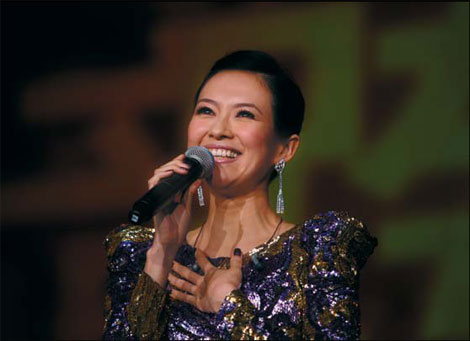 |
|
Zhang Ziyi sings at the Shenzhen Satellite TV gala. Provided to China Daily |
While much ado has long surrounded the lunar New Year's Eve TV galas, Dec 31 is becoming another night when stars shine on the small screen. Chen Nan reports.
Clad in black leather pants and a blazer, Avril Lavigne strode onto the Jiangsu Satellite TV stage half an hour before 2012 began.
She raised her arms, pointed her finger in the air, and shouted to 10,000 fans, who screeched back at her. The pop-punk queen thanked them in gasps of Mandarin: "Xie xie (Thank you)! We love China!"
Hundreds of kilometers away, Faye Wong - draped in a red skirt-cape - performed her new song, Wish, for Hunan Satellite TV's New Year's Eve gala.
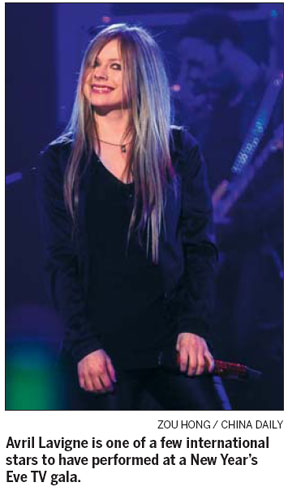
It was a far cry from Lavigne's set. The Asian pop diva, who is half-retired from showbiz, ushered in 2012 with Buddhist-style anthems.
And as the clock's minute hand approached the stroke of midnight, actress Zhang Ziyi and actor Huang Xiaoming appeared at the gala of Shenzhen Satellite TV to raise awareness about kidnapped and street children. Zhang sang a romantic ballad before the end of the show, which attracted nearly 20,000 fans.
They were among the hundreds of international stars who joined the New Year Eve galas, or kua nian wan hui, across the country on 2011's final day.
Watching CCTV's Spring Festival gala has long been a lunar New Year ritual for hundreds of millions of mainlanders. But audiences, especially youth, are tuning in to local TV stations for the Gregorian calendar's countdown to the New Year, as a growing number of stars take to the stage for these galas.
"New Year's Eve galas are a new trend for TV stations in China," says Zhang Lihua, of Hunan Satellite TV, which became the first local station to stage a New Year's Eve gala in 2005.
"The stars are TV stations' biggest selling points. A five-hour live show that gathers nearly all the big names from Hong Kong, Taiwan, the mainland and other parts of the world is fun for audiences at the venue and TV viewers at home. A New Year's Eve countdown with the stars is very exciting and is also a new experience."
Zhang also points out the idea of kua nian, or the New Year's countdown, borrows from the end-of-the-year parties of Hong Kong and Taiwan, where the countdown is traditionally preceded by star performances.
In 2005, Hunan Satellite TV held the national Supergirl singing competition, which remains one of China's most popular televised talent extravaganzas. On Dec 31, 2005, the winners, including Li Yuchun, Jane Zhang and Zhou Bichang, performed at the New Year's Eve gala with other singers, including Hong Kong's David Tao and Taiwan's Will Pan.
The 4.5-hour show topped that year's national ratings. It has since become an annual event for the station.
There were 16 New Year's Eve galas on Chinese TV in December 2011, Zhang says. They cost a total of 500 million yuan ($79.4 million).
"When I looked at the performer lists, it was really unbelievable," Zhang says.
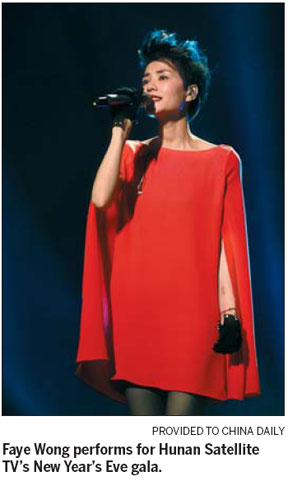
"It really is a big competition for the TV stations and a festival for audiences."
TV stations tried to book the hottest acts of the year for their end-of-2011 galas.
These include folk singer Gong Linna, who became an instant sensation for the song composed by her German husband, Tan Te, or Perturbed; newlywed Hong Kong singer-actress Karen Mok; and Taiwan singer-actor Nicky Wu, who performed at three TV stations' Dec 31 galas. Wu's TV series, Starling By Each Step, is one of the most watched of 2011.
Hunan Satellite TV vice-supervisor Li Hao says the station spent more than six months communicating with Faye Wong's agency.
"We made the greatest effort ever to invite her," Li says.
Wong's 2011 comeback tour earned more than 100 million yuan ($15.88 million) - more concert revenue than Lady Gaga, who, as Forbes magazine's "top earning female singer of 2011", rakes in $90 million a year. Her concerts earned $13 million in 2011.
Although Li didn't confirm the rumor that the station paid 2 million yuan for Wong's 10-minute performance, he admits it was a lot of money.
Wong's performance, which was widely considered off-tune, sparked hot online debate.
"Good or bad, she was the night's most welcomed star," Li says.
"The fans want to see her. That's most important."
Singers-songwriters such as Jonathan Lee, Wakin Chau and Jolin Tsai turned the gala venues into massive karaoke bars with their classic songs.
Foreign gala performers are undertaking their China tours.
Lavigne will tour the country in February. Her song Girlfriend has been used as the opening song for the popular dating show If You're the One on Jiangsu Satellite TV.
International operatic pop quartet Il Divo will also stage concerts in China in 2012 and were invited by Jiangsu Satellite TV to close the Dec 31 gala.
"Their performances at the New Year's Eve gala were a warm-up for their 2012 China concerts," Li says.
Wei Ming, the manager of Live Nation China, who brought many international acts to China, says: "It's a win-win situation for the station and for the foreign singers."
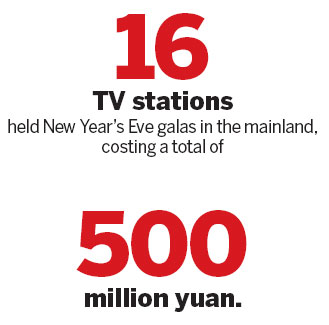
For musicians, the thrill of playing to crowds who are perhaps seeing them for the first time can be intoxicating, Wei explains.
"Local TV stations are hungry for international stars, who help them increase ratings and ad sales," he says.
"Fans are willing to pay a lot for the tickets to see so many stars in one night."
The priciest New Year's Eve gala tickets went for 2,012 yuan ($319) and sold out weeks ago.
Li Yi, a 25-year-old dancer from Hubei's provincial capital Wuhan, didn't mind shelling out that much cash to see the Jiangsu Satellite TV's gala. Neither did the four friends she went with.
"It's very exciting to watch such a star-studded show," Li Yi says.
"Although the tickets were expensive, we had a great time together, taking pictures and singing to the music. I think CCTV's lunar New Year gala is a time for family. But New Year's Eve is for friends," she continues.
"It feels very special on the last day of a year and the first day of a new year. You want to share and celebrate it with people you love."
Many who watched the galas on TV at home spent much of the night channel surfing.
"I was switching among TV stations," says Zhang Huicong, a 28-year-old advertisement design company's marketing director in Beijing.
"It's hard to watch just one gala because they all have different stars. The commercials are really annoying, and I believe the TV stations made bundles of money," he continues.
"I hope next year's gala is different. If TV stations continue to gather stars, I'll feel bored."
Today's Top News
President Xi confident in recovery from quake
H7N9 update: 104 cases, 21 deaths
Telecom workers restore links
Coal mine blast kills 18 in Jilin
Intl scholarship puts China on the map
More bird flu patients discharged
Gold loses sheen, but still a safe bet
US 'turns blind eye to human rights'
Hot Topics
Lunar probe , China growth forecasts, Emission rules get tougher, China seen through 'colored lens', International board,
Editor's Picks

|

|

|

|

|

|





